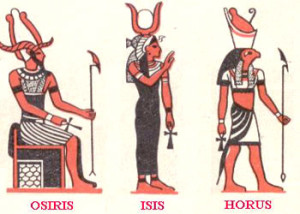God and his Son: the logic of the New Testament
Applying standard predicate logic with quantification to the New Testament.
Applying standard predicate logic with quantification to the New Testament.
Should Christians worship only God? Or God and Jesus? Or is it redundant to say that we should worship both God and Jesus? If Jesus isn’t God himself, is it therefore the sin of idolatry to worship Jesus? I address these questions in light of scripture in this screencast version of a talk I gave in Atlanta at the 2012 Theological Conference sponsored by the Atlanta Bible… Read More »Who Should Christians Worship?
Closing statements: Finnegan: 1:48:43- 1:52:12 Only one Yahweh. Jesus does things God says he can’t do, e.g. die. Jesus affirms Shema. In John 10, Jesus uses a concept of “representational deity” – i.e. calling a being who isn’t God “God” because of some likeness to God in some respect(s). Trinity is confusing, post-biblical. But it is a solution to a non-existent problem, namely, of their… Read More »Trinitarian-Unitarian Debates – 1 Bosserman vs. Finnegan, 2008 – Part 5
Bosserman questions Finnegan: 1:36:20 B: Did OT saints understand that the physical Temple would be replaced by Jesus? F: No. B: So does the NT contradict the OT on this? F: Incomplete vs. contradictory claims. B: What about Deut 12? F: Like you, I think it doesn’t predict an unending physical temple. B: Why can’t God then only later reveal himself to be not only one… Read More »Trinitarian-Unitarian Debates – 1 Bosserman vs. Finnegan, 2008 – Part 4
Time for mutual interrogations! This is the best part of this debate.
Finnegan questions Bosserman: 1:24:35 – 1:36:19
 Sean Finnegan is an intelligent and well spoken “Biblical Unitarian” Christian. He recently earned an M.A. in Church History from Boston University. He runs the christianmonotheism website, which aggregates work by contemporary Christian unitarians. I was pleased to meet him at a recent conference, at which he gave a fascinating presentation on how many (but not all) “church fathers” rejected the everlasting earthly Kingdom in favor of “going to heaven,” i.e. a non-bodily afterlife.
Sean Finnegan is an intelligent and well spoken “Biblical Unitarian” Christian. He recently earned an M.A. in Church History from Boston University. He runs the christianmonotheism website, which aggregates work by contemporary Christian unitarians. I was pleased to meet him at a recent conference, at which he gave a fascinating presentation on how many (but not all) “church fathers” rejected the everlasting earthly Kingdom in favor of “going to heaven,” i.e. a non-bodily afterlife.
Here’s a blog post by Sean on the debate I’ll be reviewing below.
Brent Bosserman was at the time of the debate an adjunct professor at Northwest University in Washington state. I believe he’s still there, but can’t find out much about him online. But here’s a long 2007 talk of his, called “Christianity and Trinitarian Worldview.” He talks at the start about his background.
This debate suffers by not having a precisely defined debate question. While Finnegan mostly sticks to the biblical case for his view and against Bosserman’s, Bosserman pulls out a broad brush and tries to compare all-encompassing “worldviews.” This is not a good idea; a debate is finite in time!
The intros are over-long and intrusive here; I’ve skipped you to the actual start. My summaries and commentary follow.
 Princeton philosopher Thomas Kelly in a paper on the epistemology of disagreement (i.e. what the reasonable response when we find the people just as smart and informed etc. as us disagree on some important matter):
Princeton philosopher Thomas Kelly in a paper on the epistemology of disagreement (i.e. what the reasonable response when we find the people just as smart and informed etc. as us disagree on some important matter):
In principle, we ought to be able to give due weight to the available reasons that support a given view, even in the absence of actual defenders of the view who take those reasons as compelling. But in practice, the case for a view is apt to get short shrift in the absence of any actual defenders. The existence of actual defenders can serve to overcome our blindspots by forcefully reminding us just how formidable the case is for the thesis that they defend… But the case for a given view itself is no stronger in virtue of the fact that that view has actual defenders…
Thomas Kelly, ” The Epistemic Significance of Disagreement,” p. 31 (in pre-print).
At first this reminded me of a proverb I’ve often thought of when reading some catholic theologian who has evidently never put the slightest effort into understanding the overall case for unitarianism:
“The first to speak in court sounds right–until the cross-examination begins.” Proverbs 18:17 (NLT)
But this is actually a different point than Kelly’s. A better courtroom analogy for Kelly’s point is:Read More »Arguing against no one
 I was interviewed a couple of times at the 2012 Atlanta Bible College Theological Conference.
I was interviewed a couple of times at the 2012 Atlanta Bible College Theological Conference.
Here’s the first, in which I ramble on about my own religious history and views about God, the Trinity, and Jesus.
Also: pacifism (I’m agin’ it. Perhaps the majority of conference goers, I think, were for it.) I wasn’t expecting that question – hence the rambling. 🙂
Thanks to Carlos Jimenez for filming, editing, and posting this. You can comment on the youtube page.
Better rambling below the fold…Read More »Ramble on

I recently stumbled upon a great post by Michael Patton that just about perfectly expresses how I’ve felt about Christian apologists since growing past teenagerhood.
In part:
This is the problem that I have with some apologists (those who defend the faith). Don’t get me wrong, I believe very much in apologetics and also love many apologists. But very rarely do I find a reasonable apologist. Most are very hardened because they are committed first to defending their particular position, not so much to learning.
Read the whole thing. He also has done a similar post recently.
I would add: apologists too often fall into mere rhetorical violence: hyperbole, attacking a straw man, verbal aggression, smug, acid condescension, simply repeating oneself more loudly, insults, poisoning the well, and so on. And this is leaving aside poorly constructed arguments. Sadly, debates between philosophers (one or both of whom may be atheists) are nearly always “cleaner” (more reasonably and respectfully conducted) than your average debate between a Christian apologist and anyone else.
I’m always reminded of what James says:Read More »Patton’s problem with Apologists
“Well, who created God, then?” Many an atheist has lobbed this one, supposing it to be a devastating objection in question form. In reply, Christian philosopher Paul Copan knocks this one out of the park. Well played, sir. I would add a few points: One of the perfections a perfect being is supposed to have is aseity – existing but not because of anything else.… Read More »Copan answers: Who created God?
“I believe in the divinity of Christ.” Perfect. Like a Rorschach test, people can read it however they want.
Help James Anderson defeat my defeater for his defeater-defeater. Here. (The target.) What’s all this defeater business? Michael Sudduth explains here. I do not look forward to the agony. May all your defeaters be defeated – except the ones you have for false beliefs.
A poor exchange. Read it first – then my comments. Where do I start? The unitarian behaves poorly. Pretending to ask questions, he instead puts forward objections. This is disrespectful. And it makes the compliments at the start seem disingenuous, which is obnoxious. But Bill serves it back, by sarcastically labeling the thing “Muslim objections…” Cute. Are these objections “simple-minded”? No, not really. What they are,… Read More »How not to conduct theological dialogue
First, I suggest we stick with “SER-ber-us” because pronouncing it “Ker-ber-us” fills some people’s heads with images like these. And we can all agree, that is not a good thing. 🙂 Last time, I mentioned Bill Craig’s recent public assertion of his Cerberus analogy for the Trinity. Here’s a remix by an Islamic apologist, with snickering commentary by Reformed Christian apologist James White. I take… Read More »Craig, White, and Cerberus
 Some interesting Q & A from philosopher-apologist William Lane Craig.
Some interesting Q & A from philosopher-apologist William Lane Craig.
First, a question inspired by internet crapola, Bill Maher’s Religulous, etc:
Jesus’ story cribbed from earlier Egyptian sources?
Son, let me take you out behind the shed.
Next?
Any good analogies for understanding the Trinity?Read More »Answers from the Answer Man

If we stick with objections arising from the text of Revelation itself, perhaps the most obvious one is that raised in a comment on previous post by my friend James Anderson. Reformulated by me, it goes:
The text itself (Rev 19:10, 22:9) asserts that we should worship only God. And yes, Revelation plainly implies that Jesus should be worshiped. And so it plainly implies that Jesus is God.
One might look to one of my favorite translations, the New Living Translation, which has these two verses saying, in part: “Worship only God”.
When you look at the Greek, though, you see that it simply says “Worship God.” Not the same thing! And most translations get this right. (Even The Message and the Good News Bible get it right.)
Where does the “only” come from? From the theological agenda of the translators; they want the text to be making the argument above. So in the ESV Study Bible, which translates these phrases correctly (“Worship God.”) they feel the theological need to add this footnote:
Human beings must not worship even the angels… God alone must be worshiped. Since the Lamb is rightly worshiped (5:8-14), he is God. (p. 2497)
Interestingly, these evangelical commenters agree with those in the recent Jewish Annotated New Testament that Revelation asserts that only God should be worshiped. In their comment on 19:7-10, they assert that
It is God, not the Lamb/Jesus, who is to be worshiped. (p. 493)
And bizarrely, in their notes on chapter 5, they ignore the obvious fact that Jesus is being worshiped together with God, although they correctly note that
The heavenly song makes a clear distinction between the enthroned one and the sacrificial lamb. (p. 474)
I’m reading between the lines here, and the commenters in this book are understandably very circumspect, but I think their assumption is Read More »Worship and Revelation 4-5 – Part 5 – An Objection
What does Revelation imply about God, Jesus, and worship? In Revelation chapter 4, the author is granted a heavenly vision: After this I looked, and behold, a door standing open in heaven! And the first voice, which I had heard speaking to me like a trumpet, said, “Come up here, and I will show you what must take place after this.” At once I was… Read More »Worship and Revelation 4-5 – Part 2 – Revelation 4
What, if anything, is wrong with this argument? 1. Only God should be worshiped. 2. Jesus should be worshiped. 3. Therefore, Jesus is God. (1,2) Before you answer, be sure you understand the claims fully. The “only” in 1 makes a claim of quantification, which we all understand in terms of identity. In standard logic, it would be analyzed as: Wg & (x)(Wx… Read More »Worship and Revelation 4-5 – Part 1 – setup
The poll below is an interesting one. (The bogus one to the left is only fun, but not interesting.) As I write this post, it is still current, and is available for voting at the upper right of the main blog page. Which of these is false? The Christian God is a self. The Christian God is the Trinity. The Trinity is not a self.… Read More »Comment on a Poll – an inconsistent triad